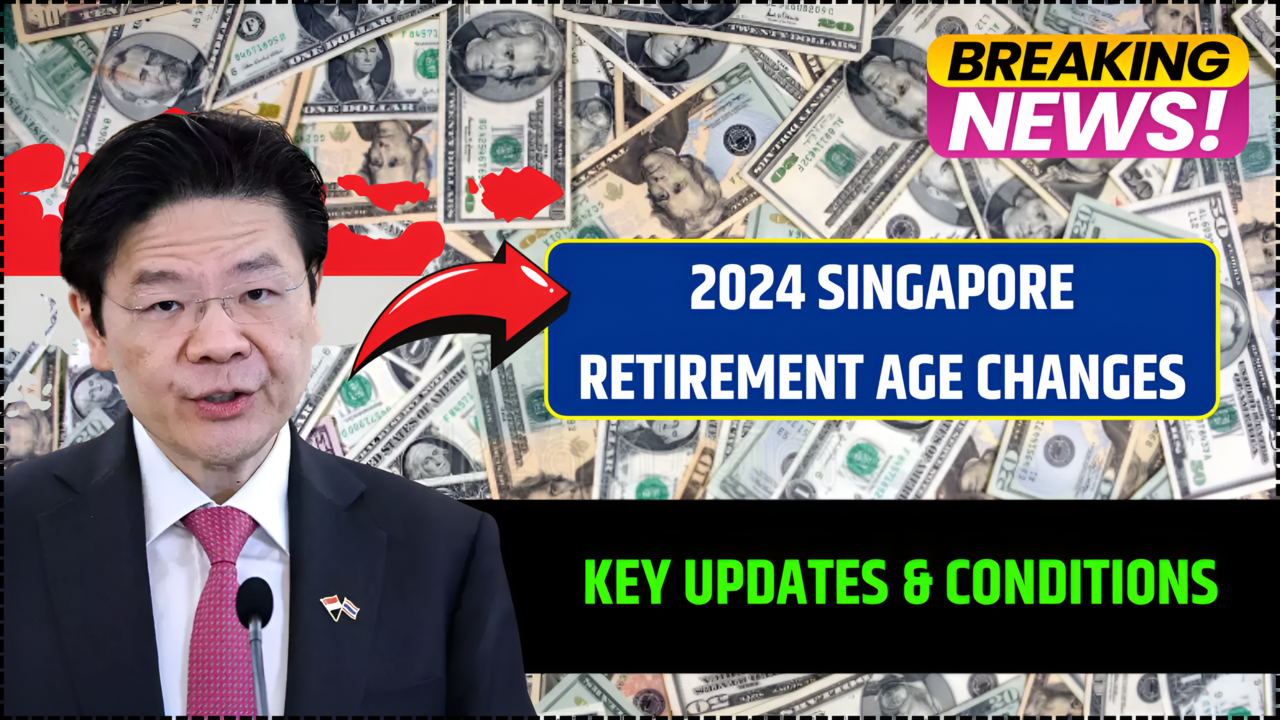As Singapore continues to adapt to the challenges of an aging population and evolving workforce dynamics, the government has introduced significant changes to the retirement and re-employment age policies. These updates aim to provide older workers with greater opportunities to remain in the workforce while ensuring their financial security and well-being. The 2024 changes reflect Singapore’s commitment to fostering an inclusive and sustainable labor market for all age groups.
In this blog post, we’ll explore the key updates to Singapore’s retirement age policies, the conditions for eligibility, and the broader implications of these changes for workers, employers, and society as a whole.
Key Updates to Singapore’s Retirement Age
The retirement age in Singapore has been a topic of ongoing discussion, with the government taking a phased approach to raising both the retirement and re-employment ages. These changes are designed to align with increasing life expectancy, improved health among older workers, and the need to address labor shortages in certain sectors.
1. Gradual Increase in Retirement and Re-Employment Ages
As of 2024, the retirement age in Singapore remains at 63, but it is set to increase to 64 by 2026 and eventually to 65 by 2030. Similarly, the re-employment age, which allows workers to continue working under certain conditions, will rise from 68 to 69 by 2026 and to 70 by 2030. These phased increases provide a gradual transition for both workers and employers, ensuring that the workforce can adapt to the new norms.
2. Enhanced Support for Senior Workers
To support older workers in staying employed, the government has introduced various initiatives, including workplace fairness legislation and financial incentives for employers. These measures aim to create a more inclusive work environment, protect senior workers from age-related discrimination, and encourage employers to invest in upskilling and reskilling their older employees.
3. Alignment with the Retirement and Re-Employment Act (RRA)
The Retirement and Re-employment Act (RRA) outlines specific conditions that employers must adhere to when managing older workers. For example, employers are prohibited from dismissing employees solely based on age before they reach the minimum retirement age of 63. This ensures job security for older workers and promotes fair treatment in the workplace.
Eligibility Conditions for Senior Workers
The updated retirement and re-employment policies come with specific eligibility criteria to ensure that the system benefits those who are genuinely committed to remaining in the workforce. Here are the key conditions outlined under the RRA:
1. Citizenship and Employment Status
To qualify for re-employment, workers must be Singaporean citizens and have been employed by their current employer before turning 55. Additionally, they must have at least two years of continuous service with the same employer.
2. Performance and Health Assessments
Senior workers seeking re-employment must meet satisfactory performance standards and be medically fit to continue working. Employers are encouraged to conduct fair and transparent assessments to determine eligibility.
3. Re-Employment Terms
Under the RRA, employers are required to offer re-employment contracts to eligible workers up to the re-employment age. These contracts should include mutually agreed-upon terms, such as job scope, salary adjustments, and working hours, to ensure that the arrangement is sustainable for both parties.
Implications of the Changes
The 2024 updates to Singapore’s retirement age policies have far-reaching implications for various stakeholders, including workers, employers, and society at large. Let’s take a closer look at the potential benefits and challenges.
1. Benefits for Senior Workers
The increased retirement and re-employment ages provide older workers with the opportunity to remain financially independent and socially engaged. By staying in the workforce longer, senior workers can continue to contribute their skills and experience, which are invaluable to their employers and the economy.
Additionally, the government’s support measures, such as workplace fairness legislation and upskilling programs, empower senior workers to adapt to changing job requirements and remain competitive in the labor market.
2. Opportunities for Employers
Employers stand to benefit from the wealth of knowledge and expertise that senior workers bring to the table. By retaining older employees, companies can reduce turnover costs, maintain institutional knowledge, and foster a diverse and inclusive workplace.
However, employers must also address potential challenges, such as bridging generational gaps in skills and adapting workplace practices to accommodate the needs of an aging workforce. This may include investing in ergonomic workspaces, flexible work arrangements, and targeted training programs.
3. Broader Societal Impact
At a societal level, the changes to Singapore’s retirement age policies reflect a shift toward greater inclusivity and sustainability. By enabling older workers to remain active participants in the economy, the government is addressing the challenges of an aging population while promoting intergenerational collaboration and understanding.
Challenges and Considerations
While the 2024 updates offer numerous benefits, they also come with challenges that must be addressed to ensure their success.
1. Adapting to Technological Advancements
One of the key challenges for senior workers is keeping up with rapid technological advancements. Employers and policymakers must work together to provide accessible training programs that help older employees develop digital skills and adapt to new technologies.
2. Balancing Work and Health
As workers age, maintaining a balance between work and health becomes increasingly important. Employers should prioritize the well-being of their senior employees by offering health benefits, wellness programs, and flexible work options.
3. Addressing Workplace Discrimination
Despite the introduction of workplace fairness legislation, age-related discrimination remains a concern for many senior workers. Continued efforts are needed to raise awareness, enforce anti-discrimination policies, and foster a culture of respect and inclusivity.
Conclusion
The 2024 changes to Singapore’s retirement age policies mark a significant step forward in creating a more inclusive and sustainable workforce. By gradually raising the retirement and re-employment ages, the government is providing older workers with the opportunity to remain active, financially secure, and socially engaged.
While challenges remain, the combination of supportive legislation, employer initiatives, and worker adaptability will play a crucial role in ensuring the success of these changes. As Singapore navigates the complexities of an aging population, the 2024 updates serve as a testament to the nation’s commitment to fostering a fair and equitable labor market for all.
Whether you’re an older worker, an employer, or simply someone interested in the future of work, these changes offer valuable insights into how societies can adapt to the evolving needs of their populations. By embracing the opportunities and addressing the challenges, Singapore is paving the way for a brighter and more inclusive future.
F&q
1. What is the new retirement age in Singapore?
The retirement age will gradually increase to 65 by 2030.
2. When will the re-employment age rise?
The re-employment age will increase to 70 by 2030.
3. Who is eligible for re-employment?
Senior workers must be Singaporean citizens with at least two years of continuous service.
4. What support is available for older workers?
The government offers workplace fairness legislation and upskilling programs.
5. What challenges do senior workers face?
Senior workers may struggle with adapting to technological changes and balancing work with health.


